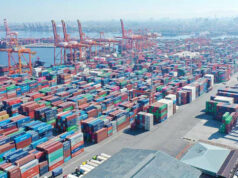
THE GOVERNMENT adoption of natural gas as a “transitional fuel” as it move towards cleaner forms of energy will hinder the rise of renewable energy (RE), a non-government organization said.
A natural gas policy “will undermine the ongoing transition to renewable energy. This has been a long process. We have already defeated the dependence on coal imports… ngayon naman ay nag-po-promote ng panibagong fossil fuel (now it is promoting another form of fossil fuel), LNG,” Gerry C. Arances, convenor of Power for People Coalition, said in a virtual briefing.
Mr. Arances said that the pushing for the utilization of liquefied natural gas exposes the Philippines to energy price volatility, which may make electricity more expensive.
He estimated the current level of coal dependence for power at “more than 60%,” he said.
The Malampaya gas field is the country’s only indigenous commercial source of natural gas. It is expected to be largely depleted of easily recovered gas using current extraction techniques by 2027.
“Even though we have Malampaya, which is depleting, we remember that even the price of domestic gas is pegged to world market prices,” Mr. Arances said.
“Hindi ibig sabihin na kapag domestic gas ay talagang mababa. (Domestic gas doesn’t mean low prices). Relatively it is lower than imported but because it is pegged to international prices, eventually if world gas prices rise, the (domestic gas price) will also increase,” he added.
Asked to comment, the Department of Energy (DoE) said it stands by its statement on the natural gas draft circular that it issued on Friday.
The DoE said the use of support technologies such as power storage systems and flexible power plants fueled by natural gas are crucial to achieving RE targets.
“Natural gas-fired power plants can serve as quick-starting reserves, which could complement the variability of RE technologies such as solar and wind,” it said.
At the end of 2022, RE accounted for about 22% of the energy mix, with coal-fired power plants accounting for nearly 60%.
The government hopes to increase the share of RE to 35% by 2030 and 50% by 2040. Last year, the DoE raised the Renewable Portfolio Standards requirement to 2.52% per annum starting 2023 from 1% previously.
The DoE also said that the proposed policy will also ensure the reliability of the power system.
According to the draft circular, distribution utilities on the Luzon grid are required to source a share of their power needs from natural gas-fired generation facilities.
Such sourcing will be conducted via auction, the Wholesale Electricity Spot Market, or a competitive selection process. — Sheldeen Joy Talavera



